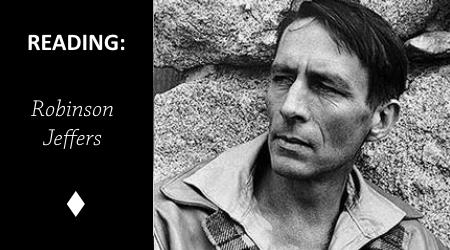Robinson Jeffers (1887-1962) wrote narrative poetry about the Californian coast. He was an icon of the environmental movement who loved nature more than man, influenced by Whitman and Wordsworth. He even called his ideas ‘inhumanism’ because he desired to change the focus from man to not man. Poets like Robert Hass , William Everson or Gary Snyder were influenced by Jeffers.
I read an observation about a wheeling vulture:
Vulture
I had walked since dawn and lay down to rest on a bare hillside
Above the ocean. I saw through half-shut eyelids a vulture wheeling
high up in heaven,
And presently it passed again, but lower and nearer, its orbit
narrowing,
I understood then
That I was under inspection. I lay death-still and heard the flight-
feathers
Whistle above me and make their circle and come nearer.
I could see the naked red head between the great wings
Bear downward staring. I said, ‘My dear bird, we are wasting time
here.
These old bones will still work; they are not for you.’ But how
beautiful
he looked, gliding down
On those great sails; how beautiful he looked, veering away in the
sea-light
over the precipice. I tell you solemnly
That I was sorry to have disappointed him. To be eaten by that beak
and
become part of him, to share those wings and those eyes–
What a sublime end of one’s body, what an enskyment; what a life
after death.
I see a sober yet intimate invocation of that longing to be part of something greater, to be literally incorporated in the vulture who glides overhead. Solemnity, veering away in the sea-light, great sails for wings, these will be interpreted as religious symbols just because we can. Let’s not. They word ‘enskyment’ is a great find, the literal opposite of ‘enterrement’, a life after death as part of the magnificence of nature.
It is a very simple event, a hiker who sees a predator bird in the sky. And look what poetry can make of it.

One thought on “Reading: Vulture by Robinson Jeffers”
Comments are closed.